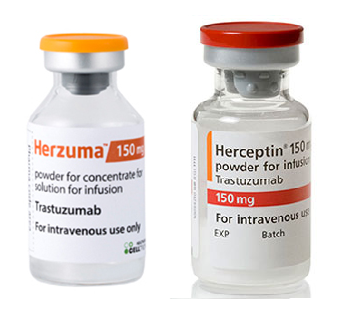Competition has been intensifying in the breast cancer therapy market due to the advent of Herceptin biosimilars, raising the question of whether Celltrion’s biosimilar Herzuma is cheaper than the original.

Celltrion first launched the biosimilar drug in Korea by marketing it to be 30 percent cheaper than Roche’s Herceptin (ingredient: trastuzumab). Biosimilars, which are interchangeable but not exact replicates of a biologic drug, often tout a price advantage to the original.
Although the Korean biopharmaceutical firm’s claim holds true in the 150 mg intravenous (IV) dosages of Herzuma and Herceptin, the situation becomes a little different when it comes to higher dosage units, as compared by this paper.
According to Korea Pharmaceutical Information Center, a 150 mg bottle of Herzuma costs 291,942 won ($271.5) while the same unit of Herceptin costs 414,103 won ($385.2), indicating a 29 percent difference.
However, a closer look at how much patients pay for each therapy revealed that there is only about 10 percent price difference between the two.
Comparing a 600 mg dose of Herceptin SC to a 440 mg of Herzuma IV injection showed a mere 9.6 percent difference in treatment costs for patients. Patients pay 74,052 won a month for a 600 mg dose of Herceptin SC and paid 66,903 won a month for a 440 mg dose of Herzuma.
This meant patients paid only 7,149 won ($6.60) less for Celltrion’s Herzuma, largely eliminating the biosimilar drug’s price competitiveness.
Considering that patients with 74 kg of weight or more taking Celltrion’s Herzuma must take an additional 150 mg dose to a 440 mg dose, the difference between treatment costs leveled out to be around the same, indicating no difference between the original and biosimilar product.
Roche’s Herceptin has been a leading breast cancer therapy with prescription sales of 101.5 billion won ($94.3 million) to treat breast cancer and other cancer types, according to data from Corezetta. The general HER2 positive breast cancer prescription market reached about 96 billion won ($89 million).

